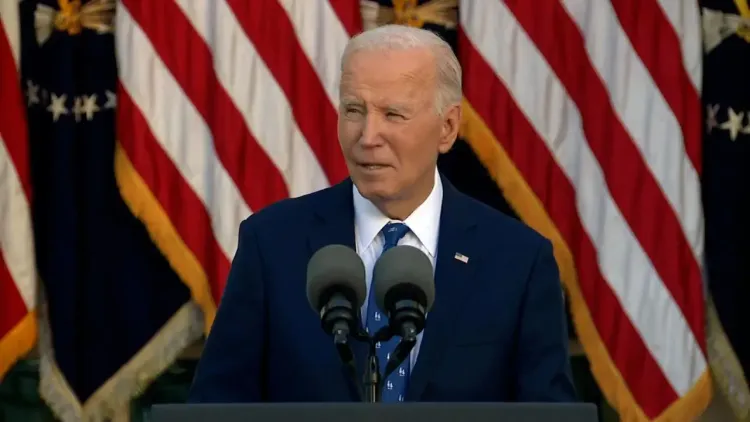Amidst Instability Post-Al-Assad's Fall, Biden Authorizes Airstrikes Against ISIS in Syria

New York, Dec 9 (NationPress) Amidst the instability in Syria following the swift removal of Bashar al-Assad, the United States launched airstrikes on positions held by Islamic State, a designated terrorist group, as President Joe Biden and his administration aim to reassess their policy in the region.
The US is confronted with a dilemma since the rebels who have taken control of Damascus and forced al-Assad into exile in Russia are led by a group also classified as a terrorist organization, Hayat Tahrir al-Sham (HTS), due to its connections with al-Qaeda.
While marking the demise of al-Assad, Biden acknowledged the risks and uncertainties present in Syria and the broader region as a part of the initial US response.
“Just today, US forces executed a series of precise airstrikes within Syria, targeting ISIS camps and operatives,” he stated.
“We are fully aware that ISIS will attempt to exploit the power vacuum. We will not permit that to occur,” he emphasized.
However, reflecting the complexities facing the US, he cautioned, “Make no mistake, some of the rebel factions responsible for al-Assad's downfall have their own troubling history of terrorism and violations of human rights.”
The conclusion of al-Assad’s 14-year regime is, according to him, “a historic opportunity for the long-suffering people of Syria to forge a brighter future for their proud nation.”
He went on to say, “It also represents a moment fraught with risk and uncertainty.”
The dangers are both internal and external, as Syria shares borders with Iraq, Turkiye, Jordan, Lebanon, and Israel, all situated in a volatile region.
Approximately 200 Indian peacekeepers from the United Nations Disengagement Observer Force (UNDOF) are deployed along the Syria-Israel border.
The US has stationed about 1,000 troops in areas previously outside al-Assad's control, primarily to train Kurdish fighters battling ISIS, known by its full name as the Islamic State.
Biden asserted that US troops would remain in the region and that facilities for detaining ISIS terrorists would continue to operate.
The US Central Command (CENTCOM) announced in a press release that over 75 “strikes against ISIS leaders, operatives, and camps were executed as part of the ongoing mission to disrupt, degrade, and defeat ISIS.”
General Erik Kurilla, who oversees CENTCOM, cautioned other factions in Syria: "All organizations in Syria should be aware that we will hold them accountable if they collaborate with or support ISIS in any capacity.”
Biden, whose strategic decisions faced scrutiny following the chaotic US exit from Afghanistan last year, took credit for the diminished influence of Russia, Iran, and Hezbollah, which contributed to al-Assad’s downfall.
“In the past week, their backing has significantly weakened, all three of them, as they are all considerably weaker today than they were when I assumed office,” he claimed.
He attributed this shift to the “setbacks” inflicted upon Russia by Ukraine and upon Hezbollah by Israel, both aided by the US.
“Our strategy has altered the balance of power in the Middle East,” he noted.
Russia, mired in Ukraine, and Iran, which has faced significant losses from Israel, were unable to assist al-Assad.
Biden remarked that al-Assad’s “regime has brutalized, tortured, and killed literally hundreds of thousands of innocent Syrians” and must be held accountable.
The leader of HTS, Abu Mohammed al-Golani, is also on the US terror watchlist, but he has stated that he has severed ties with al-Qaeda, from which his group originated.
Concerns linger regarding how far the Sunni HTS will proceed in enforcing strict Islamic laws and their treatment of non-Sunni Muslims, such as Shias and Alawites, as well as other religious minorities like Christians.
Secretary of State Antony Blinken commented, “We have taken note of the statements made by rebel leaders in recent days, but as they assume greater responsibility, we will evaluate not just their rhetoric, but their actions.”
There is also the concern that the turmoil may extend into neighboring countries.
Biden assured that the US would come to their aid should any threats emerge from Syria during this transitional phase.
While NATO member Turkiye was aligned with the US in seeing al-Assad's departure, its objectives conflict with those of the US.
While Washington backs the Kurdish minority in Syria, Ankara opposes them due to its own issues with Kurdish groups in Turkey seeking independence.
Defense Secretary Lloyd Austin spoke with Turkey’s Defense Minister Yasar Guler to discuss the situation in Syria.
Austin “acknowledged Turkiye's legitimate security concerns” while addressing the threats posed by ISIS, as reported by the Pentagon.
They emphasized the necessity of collaboration to “prevent any risks to US forces and allies, as well as the mission to defeat ISIS.”









